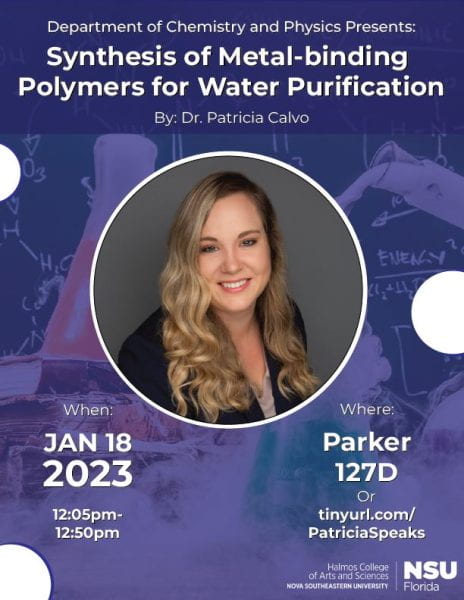 Please attend our next department seminar and don’t miss the opportunity to learn about our faculty research.
Please attend our next department seminar and don’t miss the opportunity to learn about our faculty research.
When: Wednesday, January 18, 2023
Time: 12:05pm – 12:50pm
Place: Parker 127D and via Zoom
About the talk:
Water is one of the most precious resources on our planet, making up roughly two thirds of the earth’s surface. Despite the abundance of water, access to clean water has become increasingly difficult. Decades of industrial activities and neglect for the environment have contributed to water pollution. Common pollutants include heavy metals, which are toxic and carcinogenic not only to humans but also to aquatic life. Removal of heavy metal contaminants is a critical part of water purification. While several methods exist, the use of polymers to bind heavy metals offers many advantages over comparable methods, such as improved efficiency and elimination of harmful byproducts. The goal of this project is to synthesize a series of metal chelating polymers to determine which type of polymer results in the most efficient binding to a series of metals. By altering the structure of the polymers and the identity of the chelating group, this research will help elucidate the importance of polymer structure and functionality on metal binding efficiency. Two different approaches were utilized to synthesize different metal-binding polymers: a) synthesis and post-polymerization modification of activated ester polymers via RAFT polymerization and b) functionalization of chitosan via multicomponent reactions. In the first approach, a library of functionalized metal-binding polymers can be synthesized that differ only in the identity of the chelating group while controlling molecular weight and architecture. While this approach is synthetically complex, it offers the ability to study fundamental structure-property relationships. The second approach offers a quick, efficient, and cost-effective synthesis of metal-chelators from bio-derived and renewable feedstocks.
About the speaker:
Dr. Calvo was born and raised in Dusseldorf, Germany. She moved to the United States at age 18 to attend Lindenwood University in Missouri, where she received her B.S. in Chemistry with concentration in Biochemistry. After graduating from Lindenwood, Dr. Calvo pursued her doctoral degree in Organic Chemistry at the University of Florida. Her graduate research, under the guidance of Dr. Ken Wagener and Dr. Brent Sumerlin, focused on the synthesis of well-defined functionalized polymers for biomedical applications. After receiving her PhD, Dr. Calvo accepted an industrial research position at a Biotech company in San Antonio, TX. Her research in this position focused on the applications of polymer chemistry to create advanced wound care products and antimicrobials. After two years in industry, Dr. Calvo realized that her true passion lies in academic teaching and research. After working as a Chemistry Lecturer at Texas A&M University San Antonio for a year, Dr. Calvo accepted her current position as Assistant Professor of Chemistry at Nova Southeastern University. Her research focuses on creating novel polymeric materials for applications, such as drug delivery and water purification.

